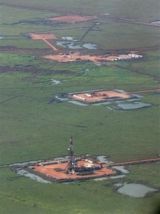Sudan Armed Forces to withdraw from oil areas
September 1, 2007 (JUBA, Sudan) — Northern soldiers deployed in Sudan’s vital southern oil fields will be withdrawn gradually, Sudanese Oil Minister Ahmed Awad al-Jaz said on Saturday.
 The army missed a key July 9 deadline to redeploy all its soldiers to the north of Sudan as per a landmark January 2005 peace deal that ended Africa’s longest civil war, which had claimed 2 million lives.
The army missed a key July 9 deadline to redeploy all its soldiers to the north of Sudan as per a landmark January 2005 peace deal that ended Africa’s longest civil war, which had claimed 2 million lives.
U.N. officials said most of the northern army’s remaining troops were in the south’s oil fields, where some 500,000 barrels per day of crude are pumped.
“As you know there is a difference between (when) you sign a peace on a paper and implement a peace on the ground. We know it takes some time,” Jaz said.
“Now that we are working peacefully, gradually we’ll get everybody away from there.”
He declined to specify a withdrawal date.
Under the deal the south formed a semi-autonomous government, and separate north and south armies. Southerners have the right to vote on secession from the north by 2011.
Southern minister for regional cooperation, Barnaba Marial, said more than 16,000 northern troops were still in oil-producing areas, which he called a violation of the deal.
U.N. Secretary General Ban Ki-moon has called for the redeployment of the northern armed forces.
“It is very clear in the (deal) that the oil areas should be demilitarised, everybody should be away, so I guess that is our ultimate goal,” Jaz said.
He was speaking at festivities to celebrate Sudan’s eighth year of exporting oil in the southern capital Juba.
Brightly costumed Chinese and Indian traditional dancers performed for an audience of mostly children seated next to posters saying Sudanese oil was for “development and unity”.
More than 95 percent of the semi-autonomous region’s income comes from oil revenues.
U.S. sanctions and the civil war pushed most Western companies to withdraw from Sudan’s oil industry, with China, Malaysia and India leading the Asian take over of the sector.
A border commission has been slow to demarcate the frontier between the north and south, a key issue ahead of elections and the vote on secession. Most oil fields lie along the disputed border.
But Jaz said the border was clear. But even if the border commission ruled that fields now in the south were in the north, compensation could be paid to the Juba-based government.
“If the (new) demarcation says there is a well said to be in the north and its clearly in the south, we can compensate,” he said.
(Reuters)
